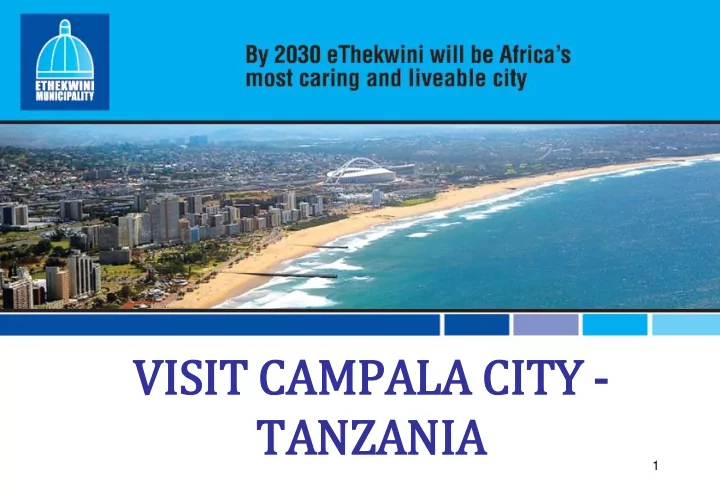

VISIT CAMPALA CITY - TANZANIA 1
SESSION 1:REVENUE UNIT
Presenter Head: Revenue Management Unit
Outline of f th the Presentation Organisational Structure Function of Department Credit Control Legislation Role of Councillors Key Challenges and Suggestions Conclusion and Recommendation 4
Organizational Arrangement Head Revenue P du Plessis (656) Manager Policy & Compliance F Khan (1) Deputy Head: Deputy Head: Deputy Head: Arrears Management Customer Services Systems P Madonsela (214) T Ndwandwe (418) Vacant (22) 5
Demographics Grand Staff Demographics Vacant F M Total African 169 95 264 Asian 103 61 164 Coloured 18 3 21 White 22 7 29 Vacant Funded to be filled 64 0 0 64 Vacant un-Funded not to be filled 114 0 0 114 Grand Total 178 312 166 656 6 See Path C:\Users\peet.duplessis\Documents\Revenue\Administrative\Budgets\Salary Budgets\REV SALARIES WORKING PAPER 2013_2014.xlsx
What our department does The Revenue Department Responsibility Rates Policy and Tariffs Credit Control and Debt Collection policy Cash Management (Cashiering to banks) Collection of revenue billed for rates, refuse, water, electricity, sewer, housing rentals and sundry charges e.g. damages to services by contractors Customer Services at counters, correspondence and call centre Training on Revenue Systems and implementation The Revenue Department also assist in: Drafting By-Laws Litigation matters Development of systems 7
The le legal/ poli licy fr framework guid iding what we do Constitution Section 152: provision of services to communities in a sustainable manner Section 229 municipalities are obliged to levy and collect rates and taxes from their residents 8
The le legal/ poli licy fr framework guid iding what we do Chapter 9 Local Government Municipal Systems Act & regulations Local Government Municipal Property Rates Act & regulation Local Government Municipal Finance Management Act S64 and SCM regulations Magistrates Court Act S58 Credit Control and Debt Collection Policy & By Law Rates Policy and By Law Reported and un-reported Judgments in our Courts 9
The Role le of f Councillo lors Section 99 of the Local Government Municipal Systems Act Supervisory Authority and must Oversee and monitor the implementation and enforcement of credit control policy and by-laws Oversee and monitor performance of administration in the implementation of credit control policy and by-laws Evaluate and review credit control policy and by-laws to improve the efficiency of the credit control mechanisms Receive regular reports on the implementation from the administration To politically back the collection processes, which was done exceptionally by by Cou ouncil an and Cou ouncillors 10
DEBT RECOVERY DAYS & COLLECTION RATE Collection Period in Days 131.6 140.0 114.5 120.0 100.0 89.9 80.3 79.6 75.1 75.1 72.6 80.0 66.6 63.6 60.0 40.0 20.0 - 2003 2004 #2005 2006 2007 2008 2009 2010 2011 2012 Collection Period in Days The average collection rate for the Year 2013 to Date (YTD) is 104.2% 11
The key challenges th that we fa fac e CHALLENGE DISCUSSION ON SOLUTIONS • Managing down government debt process for collecting from government departments • Consumers not honoring arrangements lifestyle assessment • conversion to prepaid meters • Consent to Judgment • Conversion to prepaid meters requirement for reconnection of services and credit agreement • Lack of integration of operational systems municipal systems should be capable of interfacing and operating on a common platform e.g. SCM Directors in arrears • Capacity to deal with tampering/theft appointment of panel of prosecutors • enactment of bylaws • physical inspection of properties • establish relationship with local SAPS 12
The key challenges th that we fa fac e CHALLENGE DISCUSSION ON SOLUTIONS • Registration and management of Use targeted approach • indigent households installation of water management devices and prepaid meters • assistance of ward councilors • alignment and integration with the social welfare system • Difficulty to collect from deceased Need process to enforce winding up of estates • estates Possible legislative change (Long Process) • Staff and Councillor debt municipal employees to be treated like any other customer • full provisions of the policy should be applied • Compulsory deduction from Salaries and Allowances • Using of Vacant Land for Housing Reduce revenue base • projects Need mixed development • Tax policy to drive Job creation 13
Big and Critical Question? The broad question here, is our current credit control policy adequate and are we doing enough to ensure that we collect all outstanding debt? 14
Conclusions and Recommendations Identify Indigent Households through targeted approach Ensure regular revision of policy and by- laws Find mechanism to deal with deceased estates 15
Dis iscussion & Questions 16
Recommend
More recommend